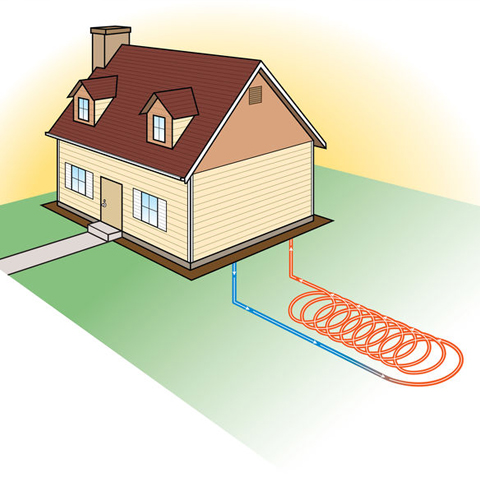What is geothermal heating?
Before we answer that question, let’s discuss what geothermal heating is first. When looking for a way to cool and heat your home these days, there are many choices to pick from, and it has been right under your feet all along. We are talking about geothermal heating, but what exactly is that?
Almost 30 feet below us, the earth’s temperature is constant. A geothermal heating system is a ground-sourced power that can cool and heat your home and provide your home with hot water. This is a technology that transfers heat to and from the ground and when compared to the traditional HVAC system, it can save you over 60%.

Is this the same thing as a heat pump? No, the biggest difference between geothermal heating vs heat pump is where they pull heat from. A heat pump pulls heat from the outside air, where the temperature fluctuates. Geothermal heating gets its heat from the ground, where the temperature is more constant.
Now that we have a better understanding of what geothermal heating is, let’s answer a few questions about this tool we’ve had all along:
How does geothermal work for heating?
A simple explanation would be: Nature uses the sun to heat the Earth’s ground during the day, a solar heating system of sorts. A geothermal heating system harnesses that heat and then distributes that heat (and air conditioning) all through your home.
To breakdown it down, a geothermal heating system can function because of the natural heat from the Earth. The ground we walk on absorbs about 50% of the energy that sun disperses and is naturally absorbed into the unground pipes that are referred to as “loops”.
A water solution circulates inside these pipes and carries the heat through the pipes to the heat pump. The heat from the water is then removed by the geothermal heat pump and is sent to the central heating system. At that point, the thermostat and a central unit control the warm air that comes into the house. To summarize:
- The Earth is heated by the sun
- That heat is transferred by underground pipes that are filled with water
- That water is sent through a heat pump
- The heat pump then sends that heated air to be distributed through the house
Radiant heating options like hot water baseboards and radiators are common in North American for distributing heat along with forced-air heating. The hot water baseboards and radiators have always used oil for their energy source and with that source becoming more expensive, homeowners have looked for other methods. Geothermal heating with baseboards has become that solution for many.
How reliable is geothermal heating?
With geothermal heating, heat is moved from one area to another, a process that takes less energy than heating cold air. This is a much more efficient way to heat a home and can save a homeowner up to 60 percent on the energy bill for heating and up to 50 percent for cooling.
The underground pipes, aka Earth loops, will last for generations and the heat-exchange equipment being inside the house can last for decades. When the time comes for any replacement of the heat-exchange equipment, it is less expensive than replacing an HVAC unit.
The thermal retention underground issues have been resolved with the new technical guidelines, now, heat can be indefinitely exchanged, making this a sustainable way to cool and heat a home. In the past, a system that was improperly sized would overcool or overheat, making the system unable to have enough temperature gradient to function properly.
Does geothermal heat feel warm?
Geothermal heating pumps can operate in cold or hot climates because the Earth has a constant temperature underground of 45° to 75° F based on the area of the country you’re located. So, if room temperature is 70°F the delivered air temperature on the average will be between 90 – 95°F.
How long does geothermal last?
The indoor components for a geothermal heating system will typically last 25 years versus the 15 years that a conventional HVAC system. The geothermal heating underground component can last up to 50 years or longer.

What are the pros and cons of geothermal heating?
We are already seeing many geothermal heating benefits and they expect it that the more common this method becomes, the more benefits we’ll notice. Incorporating geothermal energy seems like an easy decision when we consider that it doesn’t need gas or oil resources and it is economically cheaper to install. The pros of geothermal heating far outweigh the cons:
The pros of geothermal heating:
- Environmentally friendly
- Does not create significant pollution
- Efficient
- Renewable energy
- Works for any size structure
- Cost of operation won’t fluctuate saving on energy bills
- Less danger to use compared to electricity, gas, or oil
- Energy tax credit available
- Quieter operation
- Longer life expectancy with few parts
The cons of geothermal heating:
- Expensive to install
- Better in new builds as an existing structure has a high cost to retrofit
- Requires some electricity to for the heat pump
- Requires water
- Few experienced contractors for install and repairs
- Large scale geothermal power plants pose a danger to the Earth’s surface
- Tree roots and rodents can damage the underground piping
While geothermal heating has some issues and cons, the benefits and pros overpower them. This may not be right for every single home or commercial structure, but it definitely a step in the right direction to protect the natural resources we have today. The maintenance and upkeep of geothermal heating isn’t any more than the roof of a home. Want to learn more about geothermal heating in Macon, GA? Call 478-781-9107 today!